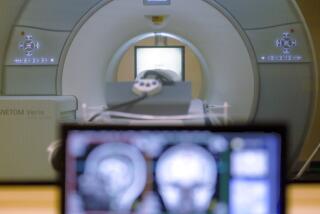‘Medical Humanist’ Translates Care Into Compassion
- Share via
BENNINGTON, Vt. — Patricia Barr was just back from a holiday trip to visit her daughter in New York, her mother was coming to visit, and she was feeling fine.
It had been 15 years since she was first diagnosed with breast cancer, and the disease had spread to other parts of her body. But physicians, friends and loved ones were unanimous. “I was doing great,” she recalled.
There was just one little problem. She had tripped and fallen a couple times during her trip. She thought that it was a new medicine she was trying and called her doctor when she got home.
Barr was told to come in right away for a magnetic resonance imaging test of her brain. The recommendation hit hard.
“It was a feeling of being insulted by the information,” said the former lawyer and member of the state Board of Education. “I’m doing so great. Don’t take it away from me two days before New Year’s.”
That’s where Celia Bandman came in. It was her job to bridge the gap between Barr’s perception of herself as mother, daughter, big-city traveler, someone looking forward to celebrating the new year -- and the health care system’s perception of her as a cancer patient with a possible brain tumor.
Bandman spoke separately with Barr and her doctor, and was able to translate what Barr now says was her “irrational” reaction of anger into a simple request to the doctor that the test be put off for a couple of weeks while Barr had a chance to get used to the idea.
Bandman is a medical humanist, the occupational title used at the fledgling Institute of Medical Humanism in Vermont. She has no formal training in medicine; instead, she brings to her work her background as a poet and writer.
In a paper on medical humanism presented to a conference at Britain’s Oxford University in June, Bandman and her co-authors quoted the poet Maxine Kumin: “The poet’s function is to speak of the encounter.”
Bandman sees the encounter as the interaction between patients and the health professionals who often see them as clinical, scientific problems described in the technical language of modern medicine.
“The language of medicine and the language of the patient’s lived world of illness are not the same,” Bandman said.
The paper said the medical humanist “validates the patient’s experience, enhances doctors’ understanding of the patient’s view and improves doctor-patient communication. The medical humanist becomes an interpreter for the doctor and an escort for the patient in the new and unfamiliar world of illness.”
Dr. Jim Wallace said he sees an irony but also a necessity that in an age of ever-increasing medical specialization, there would be a need for someone whose specialty is injecting humanism into medicine.
Wallace was Vermont’s first cancer specialist when he began the practice 40 years ago and, at 72, is himself a cancer survivor.
Technology has advanced so quickly that the doctor has to spend all his time dealing with the technical and treatment aspects of care, leaving little time to deal with the patient as a whole person, he said.
Southwestern Vermont Health Care, a regional hospital serving the Bennington area, is in the midst of an 18-month experiment in which it is funding the institute -- essentially, paying Bandman’s salary.
Hospital president Harvey Yorke said he hopes that fund-raising can keep the program going after the short-term funding runs out in October. In the longer term, the challenge will be to get medical humanism recognized well enough so that insurance companies will pay for it.
Wallace and others at the institute said medical studies have found that good doctor-patient communication can help patients stay healthier, thus keeping costs down. The institute hopes to conduct a study to see how helpful its programs are to patients.
One national expert on doctor-patient communication, Dr. Lidia Schapira, said she believes that the Bennington program is unique. Schapira is a staff physician at the breast cancer center at Massachusetts General Hospital in Boston, an assistant professor at Harvard Medical School and past chairwoman of a panel on doctor-patient communication for the American Society of Clinical Oncology.
“I’m very impressed with their approach. I think it’s a very useful model,” Schapira said.
A particular strength of the institute is its support from different disciplines within the Bennington cancer center, she said. Aside from Wallace and Bandman, the team includes patients, patient advocates and Bandman’s husband, Dr. Bernard Bandman, a psychologist.
Whether the Bennington model can be replicated “depends on who’s doing it, and how well they’re received by the professional staff,” she said.
At a recent meeting, Bandman conducted a typical exercise in one of her workshops by asking Barr and cancer patient Joan Woods to write about what waiting felt like.
“Waiting for the results of testing is grueling ... all the thoughts and emotions that it conjures ... only to find out that the doctor isn’t prepared -- the results weren’t in my folder. Now I have to wait until he leaves the room to find them. Why wasn’t he prepared? I am.”
As for Barr and her MRI, it was she who wanted to wait -- until after her mother’s visit and until she could get a start on the new year. She made a point of holding her caregivers blameless for her distress.
She had the test two weeks later. It found some cancer, which was treated with radiation and has subsided. Now, more than a year later, Barr continues to live with the disease.






